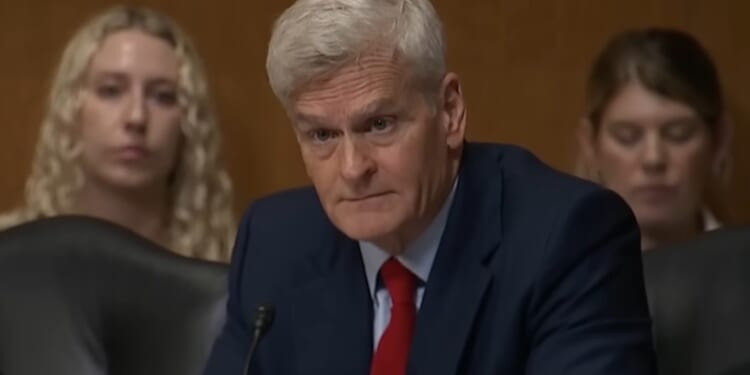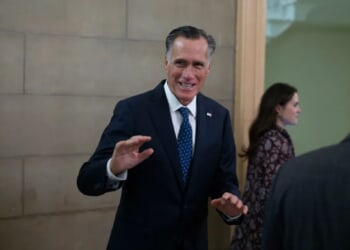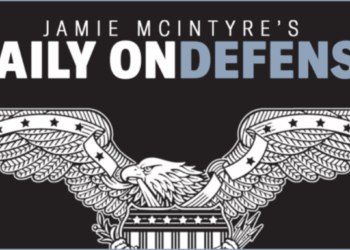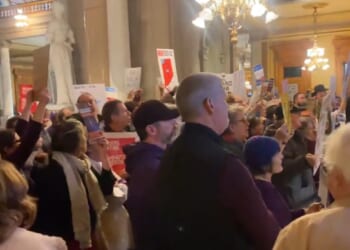WASHINGTON, D.C. — One of the more uncharted developments in the Make America Great Again (MAGA) movement is the populist-Republican courting of working-class Americans and the drive to integrate labor unions into the political fold.
The International Brotherhood of Teamsters has become the most prominent example of the unification between the populist right and organized labor, with its general president, Sean O’Brien, having spoken at the Republican National Convention that formally nominated President Donald Trump as the Republican candidate for president in 2024.
O’Brien has also been successful in advancing Lori Chavez-DeRemer, who touts her union bona fides in public speeches, as Trump’s Secretary of Labor. He has testified as a Republican-invited witness in congressional hearings and visited the White House to talk about the American worker during the 2025 government shutdown.
It is a stark contrast to the Teamsters’ activity since the mid-1990s, when the institution was captured by the federal government and controlled by Democrats until O’Brien’s insurgent election in 2021.
Some Republicans in the Senate, like Sens. Josh Hawley, R-Mo., Bernie Moreno, R-Ohio, and Roger Marshall, R-Kan., seem to have carved out an openly pro-union position within their caucus — a position bolstered by Vice President J.D. Vance when he was serving in the Senate. They have authored or backed pro-union legislation, and O’Brien has supported them in those efforts.
On Monday, another cohort of Republican senators, led by Sen. Bill Cassidy, R-La., chair of the Health, Education, Labor, and Pensions (HELP) Committee, as well as Sens. Jim Banks, R-Ind., Tommy Tuberville, R-Ala., and Tim Scott, R-S.C., offered a package of seven labor reform bills that seek to revamp labor law, which Cassidy noted has remained largely unchanged since the 1930s.
“How do you improve the voice of the worker, the choice of the worker, and the rights of the worker, in order to achieve the second goal: To have labor and business work together to create certainty, and with that certainty, to increase prosperity?” Cassidy told a small group of reporters in a Friday meeting previewing the release of the legislation.
Cassidy has offered four of the seven bills.
The Worker Reforming Elections for Speedy and Unimpeded Labor Talks (RESULTS) Act would require that union elections be done through a secret ballot with a quorum of at least two-thirds of the bargaining unit participating.
Cassidy said the bill would “discourage voting suppression tactics” from union leadership that would prefer to control the outcomes. It would extend the window in which workers can vote on continuing their relationship with a union from 30 days to 90 days, and ensure that the window of opportunity occurs every two years.
The HELP Committee also said the RESULTS Act would “create a stronger link between a union election and a first collective bargaining agreement by aligning workers’ first opportunity to choose a different union or not have a union with their first collective bargaining agreement.”
Cassidy’s Fairness in Filing Act would overhaul the process through which unfair labor practice charges are filed with the National Labor Relations Board (NLRB), which Republicans say are filed to extend negotiation timelines or gain leverage in those negotiations. It would require the inclusion of evidence in the filing, the sharing of evidence with parties, and the imposition of penalties for filing frivolous charges.
In the Friday meeting, staff noted that about half of unfair labor charges are dismissed, according to the NLRB.
The Union Members Right to Know Act would require that unions regularly inform workers of their rights to object to dues being used to advance political spending, and would have workers use an opt-in system for their dues being used on non-union representation activities if the union leadership decided to subsidize political speech with which the workers disagree.
Banks’ bill, the Put American Workers First Act, would make it an unfair labor practice to allow illegal immigrants to join unions. While it is unclear just how often this happens (though HELP Committee legislative staff told The Federalist that it did), the bill should be an obvious conclusion in light of the underlying reality that illegals should not be working anywhere in the United States, ever, in the first place. Currently, the NLRB is silent on the matter, according to HELP Committee staff.
Tuberville’s bill would clarify that the “National Labor Relations Act does not nullify federal antidiscrimination law,” and Scott’s “protects workers’ personal data in the unionizing process and prevents use of the data for efforts not related to labor organizing.”
Cassidy told reporters that the legislative package is not meant to “tear up unions,” and, responding to a question from The Federalist, said that the offerings are not supposed to be in contrast to bills introduced by Hawley, Moreno, and Marshall.
“We’re all trying to find the answers. I don’t consider this a competition, except in, if you will, the marketplace of ideas,” Cassidy told The Federalist, noting the proposals need 60 votes to pass. “What is something where Republicans can land on that can also attract sufficient Democratic support in order to achieve that certainty for business and labor?”
When asked if he worked with unions to create the package, Cassidy said, “We have to give President Trump credit for recognizing the importance of unions,” mentioning O’Brien and Vance, and added that he had spoken to unions and businesses.
“The chairman of a committee is not a czar dictating results,” he said. “The chairman of the committee is someone who’s trying to amalgamate different points of view into a single position which can be acceptable to everybody.”
The Teamsters, pressing for Hawley’s bill, appeared skeptical of the Cassidy-backed bills as well, even while acknowledging Cassidy’s willingness to participate in the conversation.
“The Faster Labor Contracts Act is bipartisan in both the House and Senate and has the votes to pass mark-up in Chair Cassidy’s Committee,” Teamsters spokeswoman Kara Deniz told The Federalist. “We appreciate Chair Cassidy’s interest in dialogue on labor reform, but instead of introducing legislative packages that will not receive bipartisan support, Chair Cassidy should schedule a mark-up on a serious bill like the Faster Labor Contracts Act.”
Some political consultants close to the MAGA-labor unification drive are more critical of the tranche of bills, however. One person granted anonymity due to their proximity on related issues told The Federalist that the bills seem like a distraction from the Hawley-Moreno-Marshall faction of the labor conversation within the Republican Party.
“If you look at the failed state of the Democratic Party, and just set that aside, and you look at the Republicans, who are essentially Business Roundtable chamber people, who are basically trying to weather the MAGA storm. … They want the votes from working people, but they still want to be the Republican Party of 1988,” the consultant told The Federalist.
“They’re hoping that they’re going to weather the storm, and they don’t want people like Hawley and Moreno and various people like that to be ascendant,” the consultant added, noting that messaging on being the party of working families won Republicans the White House, but that not acting on that momentum immediately will bring political consequences, given how quickly political tides can change.
Cassidy said, however, that all the bills have Trump-aligned principles as their starting point, while accounting for the reality that Democrats are necessary to pass the legislation.
Breccan F. Thies is the White House correspondent for The Federalist. He previously covered education and culture issues for the Washington Examiner and Breitbart News. He holds a degree from the University of Virginia and is a 2022 Claremont Institute Publius Fellow. You can follow him on X: @BreccanFThies.















